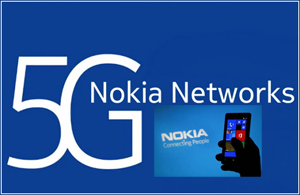New Delhi, Apr 10: Nokia phones might be making a comeback in a partnership with HMD Global, but the Finnish company is also investing heavily in networks and communications across the world, particularly 5G technology. Nokia had in March announced partnerships with Airtel and BSNL for preparing 5G networks in India, and now according to a report in Economic Times, the company has MOUs with both players.
 According to Nokia, it will work with BSNL “to accelerate the development of a 5G ecosystem,” and is looking at how the “extreme high-speed wireless broadband with ultra-low-latency” can be developed in the country to support Internet of Things (IoT) and future smart cities. Nokia and BSNL will be conducting joint 5G demonstrations across India.
According to Nokia, it will work with BSNL “to accelerate the development of a 5G ecosystem,” and is looking at how the “extreme high-speed wireless broadband with ultra-low-latency” can be developed in the country to support Internet of Things (IoT) and future smart cities. Nokia and BSNL will be conducting joint 5G demonstrations across India.
Nokia is also partnering with Airtel for this 5G ecosystem development as well. Both players will look at network evolution to 5G, exploring operations, cost-effectiveness, quality and reliability. The partnerships will look at creating a strategy and clear path for the evolution of 5G in India, and the efforts will build on the current 4G networks.
“In line with the Indian Government"s thrust to boost the digital infrastructure to enhance economic growth, Nokia is delighted to partner with BSNL in the development of 5G ecosystem for the Indian market. We will leverage our global experience in 5G-related industry projects and collaborations to enable BSNL to evolve their networks for the programmable world,” Sanjay Malik, head of India Market, Nokia had said in an earlier press statement.
Of course, the announcement of MoUs should not be taken to mean that 5G will happen in the next couple of months. Airtel, BSNL will currently be testing the technology with Nokia"s help, which is providing the network solutions. It could take a couple of years, before 5G becomes mainstream in India.
5G is supposed to be the next level of evolution in wireless broadband technology, but at speeds which are much higher than the current 4G LTE networks. The idea with 5G is not just fast internet, though the speeds will be at upwards of 20GBPs, but it will also be an ultra low latency network.
The idea is not just powering videos uploads on your smartphones, but also looking at IoT devices, smart cities, where such speeds will be crucial for dealing with big data. 5G will be driven by the Internet of Things, and players like Samsung, Huawei are also making massive investments in this upcoming technology.





Comments
Add new comment